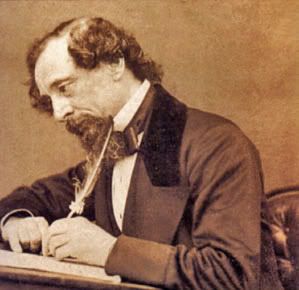Google Notebook & Quick Pulls of Inspiration
By Therese Walsh | December 19, 2007 |
 Google Notebooks updates are up. Check them HERE.
Google Notebooks updates are up. Check them HERE.
I really like to read the Writer’s Almanac daily. Love me my poetry fix, and the graphs that follow the poem often include mini biographies of writers whose birthday falls on a given day. Today’s outtakes were particularly enjoyable. Here are a few:
It’s the birthday of writer Italo Svevo, (books by this author) born in Trieste, Italy (1861). He was a closet writer who worked as a bank clerk and then got a job in his father-in-law’s paint-making plant. When Svevo decided to take some English classes for business reasons, the tutor that he found turned out to be aspiring writer James Joyce, who was living in Trieste at the time. Svevo confessed to Joyce that he had written two failed novels, and after reading them, Joyce told Svevo that he was a neglected genius. Svevo was inspired to write a fictional memoir about a patient undergoing psychoanalysis, which took him 10 years to finish. His self-published book The Confessions of Zeno (1923) is considered one of the greatest Italian novels of the 20th century.
More after the Click…
It’s the birthday of Jean Genet, (books by this author) born in Paris, France (1910). He was a burglar and a vagabond, who spent his time in prison reading contraband copies of Dostoyevsky and Stendhal, and he wrote fiction and poetry on brown paper bags. In prison, he penned a novel about a murderer who had been executed in jail, and a friend smuggled it out and gave it to the writer Jean Cocteau. Cocteau helped Genet get out of prison, and he published Genet’s novel Our Lady of the Flowers (1944). Genet wrote many more novels, including Miracle of the Rose (1946) and The Thief’s Journal (1949). He said, “If my song was beautiful… who will dare to say that its inspiration was vile.”
It’s the birthday of novelist Eleanor Hodgman Porter, (books by this author) born in Littleton, New Hampshire (1868). She was the author of Pollyanna (1913), about a young girl who always tries to see the positive side of things despite her hardships. The book was wildly successful and was ultimately the basis for a play, a movie, a calendar, and a daily almanac of reasons to be glad. The word “Pollyanna” eventually entered our vocabulary, defined by Webster’s Dictionary as, “One having a disposition or nature characterized by irrepressible optimism and a tendency to find good in everything; an overly and often blindly optimistic person.”
It was on this day in 1843 that Charles Dickens (books by this author) came out with A Christmas Carol. He got the idea in mid-October and struggled to finish the story in time for the holidays. He published the book himself with gilt-edged pages and a red bound cover within a week of Christmas and sold 6,000 copies in the first few days. The instant best-seller revived Christmas when it was on the decline in England, during the Industrial Revolution, and it launched Dickens into a fame much like The Beatles — on his reading tours, Charles Dickens was mobbed by adoring fans, who would rip his clothes, wait in long lines to shake his hand, and pull down the windows on his train car to grab at him.
Look for a post from Dave Duggins in a little bit. Write on, all!










thanks, WU. I love these inspirational writers’ stories.